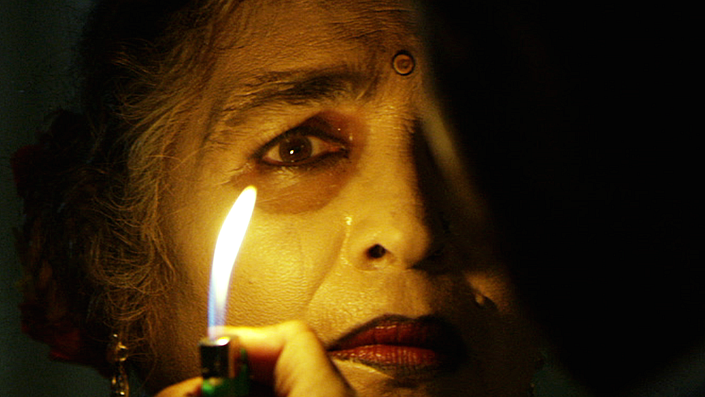Perturbing films don’t always make for profound ones. A self-proclaimed dark take on the classic fairytale, Red Riding Hood, Ajji (grandmother/granny in Marathi), directed by Devashish Makhija and structured as a rape-revenge thriller is about a grandmother who turns vigilante following the heinous rape of her 10-year-old granddaughter, Manda. Populated with the usual suspects – a powerful perpetrator (Dhavle, the son of a politician), a corrupt policeman, the criminal-cop nexus, the film only breaks new ground in its choice of the protagonist.
When you think ‘grandmother’, you think a blanket of warmth, protective yet frail. When someone like her, takes matters in her own hands, you would expect the film to set a precedent by portraying a character, one may not have seen on screen. On a thematic level, Ajji makes a bold choice.
The protagonist, an old arthritic woman living in a squalid slum, in proximity to a red light area cuts a poignant figure. This subversion aside, Ajji gets too clinical in its depiction of the depravity of the act itself than its psychological impact on Manda.
Do we need a stylised film to tell us that rape is a heinous act? When it comes to narratives about rapes, what makes a story empathetic or exploitative, depends on the point of view, from which it unfolds. Who faced the violation and who has the agency?
Ajji seems to be determined to make you viscerally live through the horrors of rape, directing your attention towards all that’s monstrous about the act without letting us in on the emotional landscape of the survivor. The treatment echoes that of Korean revenge dramas. Do we need a stylised film to tell us that rape is a heinous act? When it comes to narratives about rapes, what makes a story empathetic or exploitative, depends on the point of view, from which it unfolds. Who faced the violation and who has the agency?
We are repeatedly shown blood stains on Manda’s clothes and how an interrogator, a doctor and her parents ask her to spread her legs to examine her vagina. As the film cashes in on the issue of ‘rape’ with long takes, one can’t help but wonder about the psychological well-being of the child actor playing out the graphic scenes.
One would contend in favour of the ‘unpalatable’ scenes saying the purpose of a visual medium is to show and not tell. I would argue that when it comes to handling child rape, evoking the emotions of dread and compassion on screen is more important and more responsible than making a spectacle of it.
When it comes to handling child rape, evoking the emotions of dread and compassion on screen is more important and more responsible than making a spectacle of it.
In a particularly ‘disturbing’ scene Dhavle, the rapist is seen having sex with a mannequin. The length of the scene goes to show that the film is more interested in giving us a full-blown view into the perverse tendencies of the unidimensional Dhavle. And it is not a ‘whydunnit’ glimpse a la Mindhunter (Netflix series) but a purely sordid one as style takes precedence over substance.
The scene where Manda asks Ajji if she is truly flowered into being a woman, now that she is incessantly bleeding after the sexual assault, tugs at your heartstrings and disturbs you in the real sense. It gives you a glimpse into the abyss of agony that the little girl may have to stare into, where she equates rape with womanhood.
The scene where Manda asks Ajji if she is truly flowered into being a woman, now that she is incessantly bleeding after the sexual assault, tugs at your heartstrings and disturbs you in the real sense.
The grungy setting of the film also does not live up to reality. Slums in India may be grimy but they are a bustling microcosm. The slums portrayed in the film are too conveniently unpeopled. The milieu seems to be choreographed to appear gritty rather than organically being one. It is this indulgence that takes the punch out of the feature film, which would have otherwise been more impactful as a short film.
(Breathe In, Breathe Out: Are you finding it tough to breathe polluted air? Join hands with FIT in partnership with #MyRightToBreathe to find a solution to pollution. Send in your suggestions tofit@thequint.com or WhatsApp @ +919999008335)
